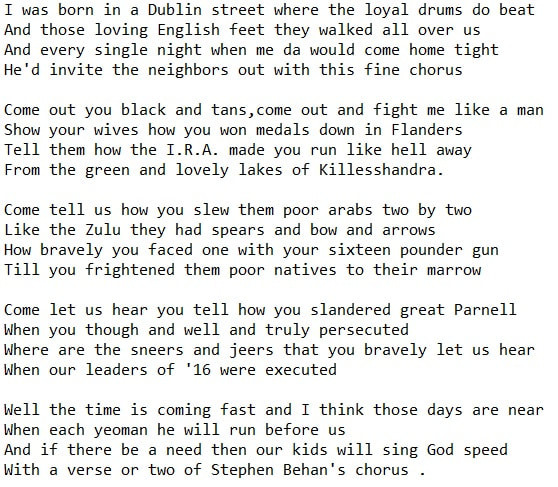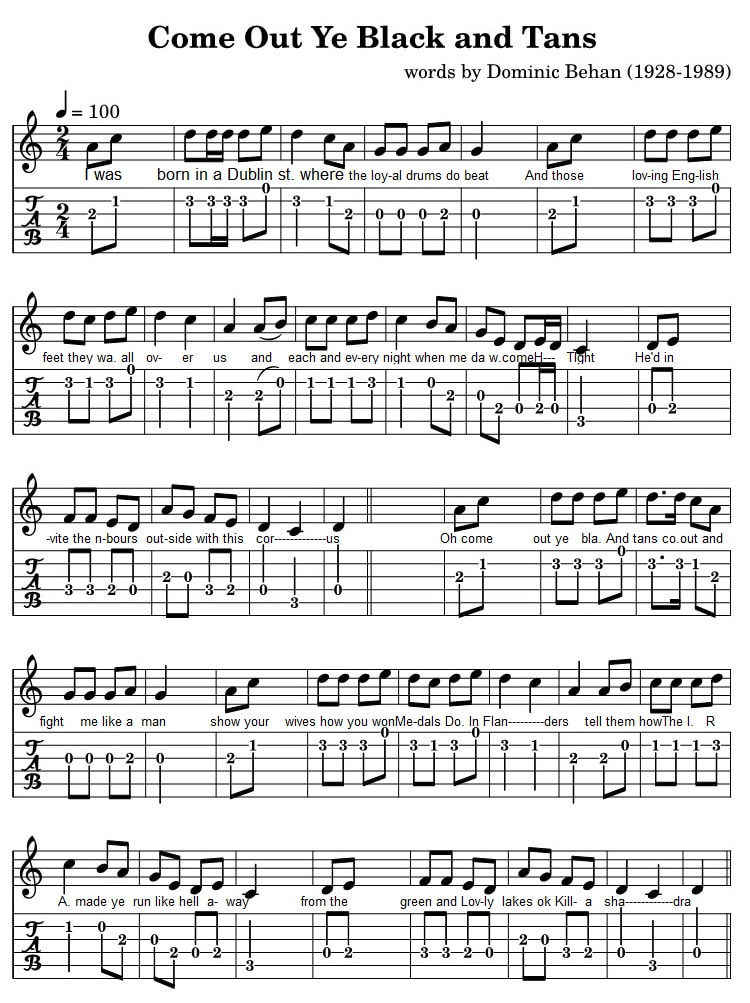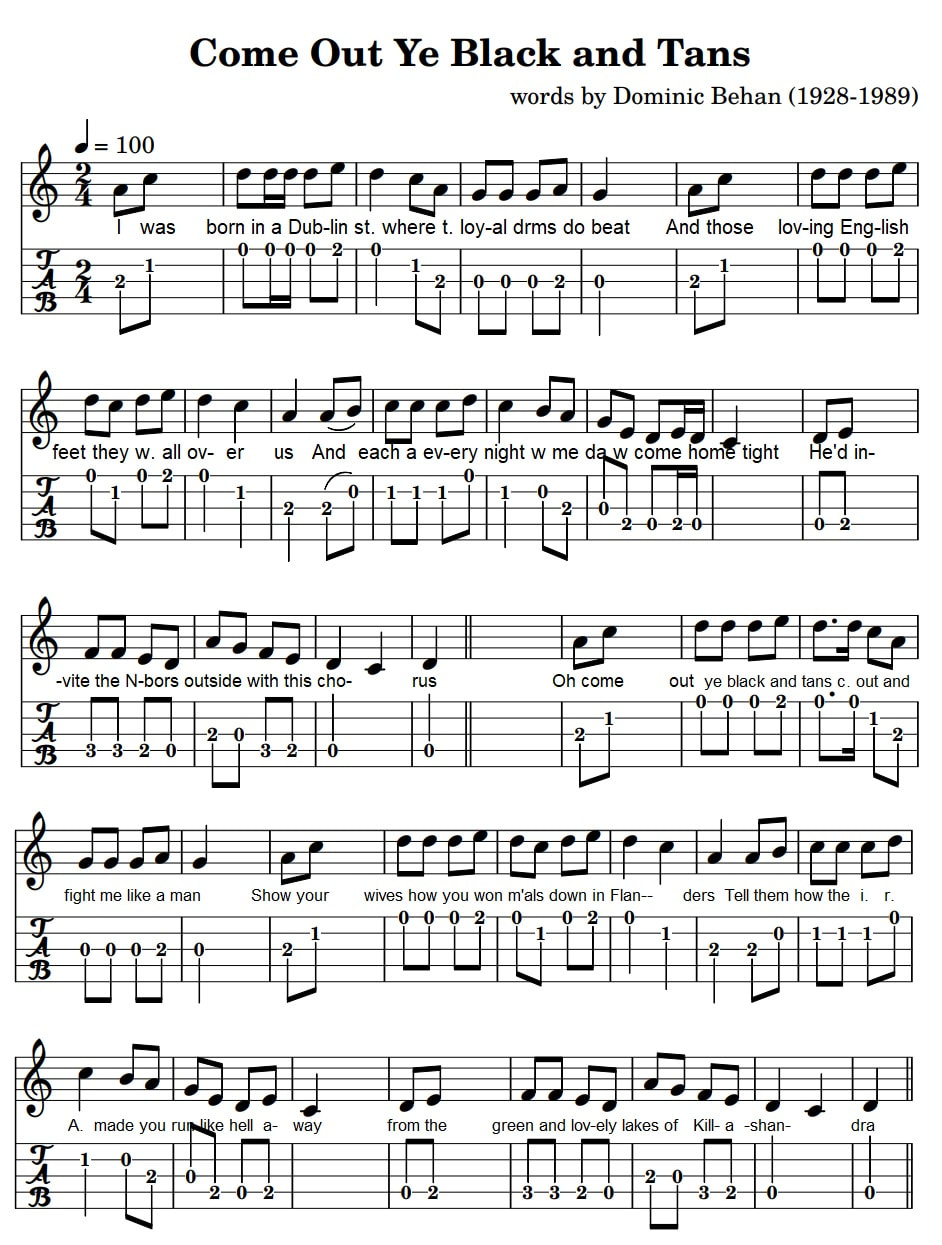Come Out You Black And Tans, Irish Song Lyrics And Guitar chords
Come out you black and tans fingerstyle guitar tab now included plus the 5 string banjo tab in open G tuning. This Irish rebel song was recorded by The Wolfe Tones, Written By singer / songwriter Dominic Behan. The 5 string banjo chords are now included. Also recorded by Gary Og [Eire Og] and Paddy Reilly. The notes for mandolin / banjo are included. The Wolfe Tones play this song in the key of Cm. It was also recorded by The Irish Discendants, The Battering Ram, Paddy Reilly, The Davitts and Charlie And The Bhoys to name a handful. There's a version on youtube that's called ''Come Out And Fight'' which was recorded by The Battering Ram. On the 8th of January 2020 Come Out You Black And Tans went to the number 1 spot in Ireland and the U.K. on the itunes singles chart with the Wolfe Tones live version. The song is about the father of songwriter, Dominic Behan, and how he used to tease the Black And Tans when he'd be coming home from the pub. Go to The Wolfe Tones Lyrics And Chords .
I[Am] was born in a Dublin street where the[G] loyal drums do beat
And those[Am] loving English feet they walked all over us
And every single night when me[C] da would come home[Am] tight
He'd[Am] invite the neighbors[G] out with this fine[Am] chorus
[Chorus]
Come out you black and tans,come out and fight me like a man
Show your wives how you won medals down in Flanders
Tell them how the I.R.A. made you run like hell away
From the green and lovely lakes of Killesshandra.
[2]
Come tell us how you slew them poor arabs two by two
Like the Zulu they had spears and bow and arrows
How bravely you faced one with your sixteen pounder gun
Till you frightened them poor natives to their marrow
[3]
Come let us hear you tell how you slandered great Parnell
When you though and well and truly persecuted
Where are the sneers and jeers that you bravely let us hear
When our leaders of '16 were executed
[4]
Well the time is coming fast and I think those days are near
When each yeoman he will run before us
And if there be a need then our kids will sing God speed
With a verse or two of Stephen Behan's chorus .
Here's a slightly different version of the above chords.
I[Am] was born in a Dublin street [G]where the loyal [Em]drums do beat
And those[Am] loving English feet they walked [Em]all over [Am]us
And [C]every single night when me[G] da would come home[Em] tight
He'd in[Am]vite the neighbors[Em] out with this fine[Am] chorus
[Am]Come out you black and tans,come out and [G]fight me like a [Em]man
Show your [Am]wives how you won medals down in Flanders
Tell them [C]how theI.R.A. made you [G]run like hell a[Em]way
From the [Am]green and lovely [Em]lakes of Killes[Am]shandra.
I usually play the above version with a capo on the second fret, give it a try, it might just suit your voice.
And those[Am] loving English feet they walked all over us
And every single night when me[C] da would come home[Am] tight
He'd[Am] invite the neighbors[G] out with this fine[Am] chorus
[Chorus]
Come out you black and tans,come out and fight me like a man
Show your wives how you won medals down in Flanders
Tell them how the I.R.A. made you run like hell away
From the green and lovely lakes of Killesshandra.
[2]
Come tell us how you slew them poor arabs two by two
Like the Zulu they had spears and bow and arrows
How bravely you faced one with your sixteen pounder gun
Till you frightened them poor natives to their marrow
[3]
Come let us hear you tell how you slandered great Parnell
When you though and well and truly persecuted
Where are the sneers and jeers that you bravely let us hear
When our leaders of '16 were executed
[4]
Well the time is coming fast and I think those days are near
When each yeoman he will run before us
And if there be a need then our kids will sing God speed
With a verse or two of Stephen Behan's chorus .
Here's a slightly different version of the above chords.
I[Am] was born in a Dublin street [G]where the loyal [Em]drums do beat
And those[Am] loving English feet they walked [Em]all over [Am]us
And [C]every single night when me[G] da would come home[Em] tight
He'd in[Am]vite the neighbors[Em] out with this fine[Am] chorus
[Am]Come out you black and tans,come out and [G]fight me like a [Em]man
Show your [Am]wives how you won medals down in Flanders
Tell them [C]how theI.R.A. made you [G]run like hell a[Em]way
From the [Am]green and lovely [Em]lakes of Killes[Am]shandra.
I usually play the above version with a capo on the second fret, give it a try, it might just suit your voice.
Come out you black and tans fingerstyle guitar tab
The Irish War of Independence, which lasted from 1919 to 1921, was a pivotal moment in Irish history. It was a time of political turmoil, violence, and resistance as the Irish people fought for their independence from British rule. During this time, a song emerged that would become an anthem for the Irish independence movement – “Come Out You Black And Tans.”
The song, also known as “The Black and Tans,” was written by Dominic Behan, an Irish songwriter and political activist. It was inspired by the Black and Tans, a notorious paramilitary group recruited by the British government to help suppress the Irish rebellion. The Black and Tans were known for their brutal tactics, including burning homes and villages and targeting civilians. The song was a call to action for the Irish people, urging them to resist the oppressive forces and fight for their freedom.
In this thesis, I will examine the history and significance of “Come Out You Black And Tans” as a symbol of the Irish struggle for independence. I will explore the origins of the song, its lyrics, and the impact it had on Irish society during this tumultuous period.
The origins of “Come Out You Black And Tans” can be traced back to the Irish War of Independence. In 1919, the Irish Republican Army (IRA) launched a guerrilla campaign against British forces in Ireland. The British government responded by sending in the Black and Tans, a group of former soldiers from World War I, to help quell the rebellion. The Black and Tans were notorious for their brutal tactics and quickly gained a reputation for their violence and indiscriminate attacks on civilians.
Amidst this conflict, Dominic Behan wrote “Come Out You Black And Tans” as a rallying cry for the Irish people. The song was first performed in a Dublin pub and quickly spread throughout Ireland. Its popularity grew as the conflict between the Black and Tans and the IRA intensified. The song was often sung at Irish rebel gatherings and became a symbol of resistance against British oppression.
The lyrics of “Come Out You Black And Tans” are powerful and evocative, making use of strong imagery and emotive language to convey the message of Irish defiance. The opening lines, “Come out you Black and Tans, come out and fight me like a man, show your wife how you won medals down in Flanders,” directly challenge the Black and Tans’ masculinity and mock their war achievements in World War I. The lyrics go on to paint a vivid picture of the Black and Tans’ brutal actions in Ireland, including burning homes and killing innocent civilians, and call for their expulsion from the country.
The impact of “Come Out You Black And Tans” on Irish society during the War of Independence cannot be overstated. The song became an anthem for the Irish independence movement, with its powerful lyrics and catchy tune inspiring and uniting the Irish people in their fight against British rule. It was often sung at political rallies and gatherings, and its popularity extended beyond Ireland, with Irish communities in other countries also adopting it as a symbol of their heritage and their support for the Irish cause.
The song also had significant implications for the Black and Tans themselves. As their reputation for violence and brutality grew, they became increasingly despised by the Irish population. “Come Out You Black And Tans” became a taunt and a warning to the paramilitary group, a reminder that the Irish people would not be cowed by their actions.
In conclusion, “Come Out You Black And Tans” is a powerful and enduring symbol of the Irish struggle for independence. Its lyrics and melody have stood the test of time, and it continues to be sung and remembered as a representation of Irish resistance and resilience. The song’s impact on Irish society during the War of Independence and its lasting legacy make it a significant piece of Irish history and a testament to the power of music as a tool for political and social change.
The song, also known as “The Black and Tans,” was written by Dominic Behan, an Irish songwriter and political activist. It was inspired by the Black and Tans, a notorious paramilitary group recruited by the British government to help suppress the Irish rebellion. The Black and Tans were known for their brutal tactics, including burning homes and villages and targeting civilians. The song was a call to action for the Irish people, urging them to resist the oppressive forces and fight for their freedom.
In this thesis, I will examine the history and significance of “Come Out You Black And Tans” as a symbol of the Irish struggle for independence. I will explore the origins of the song, its lyrics, and the impact it had on Irish society during this tumultuous period.
The origins of “Come Out You Black And Tans” can be traced back to the Irish War of Independence. In 1919, the Irish Republican Army (IRA) launched a guerrilla campaign against British forces in Ireland. The British government responded by sending in the Black and Tans, a group of former soldiers from World War I, to help quell the rebellion. The Black and Tans were notorious for their brutal tactics and quickly gained a reputation for their violence and indiscriminate attacks on civilians.
Amidst this conflict, Dominic Behan wrote “Come Out You Black And Tans” as a rallying cry for the Irish people. The song was first performed in a Dublin pub and quickly spread throughout Ireland. Its popularity grew as the conflict between the Black and Tans and the IRA intensified. The song was often sung at Irish rebel gatherings and became a symbol of resistance against British oppression.
The lyrics of “Come Out You Black And Tans” are powerful and evocative, making use of strong imagery and emotive language to convey the message of Irish defiance. The opening lines, “Come out you Black and Tans, come out and fight me like a man, show your wife how you won medals down in Flanders,” directly challenge the Black and Tans’ masculinity and mock their war achievements in World War I. The lyrics go on to paint a vivid picture of the Black and Tans’ brutal actions in Ireland, including burning homes and killing innocent civilians, and call for their expulsion from the country.
The impact of “Come Out You Black And Tans” on Irish society during the War of Independence cannot be overstated. The song became an anthem for the Irish independence movement, with its powerful lyrics and catchy tune inspiring and uniting the Irish people in their fight against British rule. It was often sung at political rallies and gatherings, and its popularity extended beyond Ireland, with Irish communities in other countries also adopting it as a symbol of their heritage and their support for the Irish cause.
The song also had significant implications for the Black and Tans themselves. As their reputation for violence and brutality grew, they became increasingly despised by the Irish population. “Come Out You Black And Tans” became a taunt and a warning to the paramilitary group, a reminder that the Irish people would not be cowed by their actions.
In conclusion, “Come Out You Black And Tans” is a powerful and enduring symbol of the Irish struggle for independence. Its lyrics and melody have stood the test of time, and it continues to be sung and remembered as a representation of Irish resistance and resilience. The song’s impact on Irish society during the War of Independence and its lasting legacy make it a significant piece of Irish history and a testament to the power of music as a tool for political and social change.
Mandolin/Banjo Tin Whistle Notes For Come Out You Black And Tans
C C C C C D' C
A# G F# F# F# G F#
A# A# C B C B C B C D' C A# G
A# A# A# A# C C
A# G F# D C D A#
C D E E D C G F E D C A# C
(Chorus)
C C C C C D' C
A# G F# F# F# G F#
A# A# C B C B C B C D' C A# G
G A# A# A# A# A# C A#
A# G F# D C D A#
C D E E D C G F E D C A# C
The sheet music for Come Out You Black And Tans .
C C C C C D' C
A# G F# F# F# G F#
A# A# C B C B C B C D' C A# G
A# A# A# A# C C
A# G F# D C D A#
C D E E D C G F E D C A# C
(Chorus)
C C C C C D' C
A# G F# F# F# G F#
A# A# C B C B C B C D' C A# G
G A# A# A# A# A# C A#
A# G F# D C D A#
C D E E D C G F E D C A# C
The sheet music for Come Out You Black And Tans .
Here's the guitar chords as played by The Wolfe Tones.
The intro. Eb Gm Cm
I[Cm] was born in a Dublin street [Bb]where the loyal [Gm]drums do beat
And those[Cm] loving English feet they walked [Gm]all over [Cm]us
And [Eb]every single night when me[Bb] da would come home[Gm] tight
He'd in[Cm]vite the neighbors[Gm] out with this fine[Cm] chorus
[Chorus]
[Cm]Come out you black and tans,come out and [Bb]fight me like a [Gm]man
Show your [Cm]wives how you won medals down in Flanders
Tell them [Eb]how theI.R.A. made you [Bb]run like hell a[Gm]way
From the [Cm]green and lovely [Gm]lakes of Killes[Cm]shandra.
The intro. Eb Gm Cm
I[Cm] was born in a Dublin street [Bb]where the loyal [Gm]drums do beat
And those[Cm] loving English feet they walked [Gm]all over [Cm]us
And [Eb]every single night when me[Bb] da would come home[Gm] tight
He'd in[Cm]vite the neighbors[Gm] out with this fine[Cm] chorus
[Chorus]
[Cm]Come out you black and tans,come out and [Bb]fight me like a [Gm]man
Show your [Cm]wives how you won medals down in Flanders
Tell them [Eb]how theI.R.A. made you [Bb]run like hell a[Gm]way
From the [Cm]green and lovely [Gm]lakes of Killes[Cm]shandra.
Here's the guitar chords as played by The Irish Descendants
The intro. Bm A F#m Bm D A F#m Bm A Bm
I[Bm] was born in a Dublin street where the [[A]loyal drums do [F#m]beat
And those[Bm] loving English feet they walked all over us
And [D]every single night when me[A] da would come home[F#m] tight
He'd in[Bm]vite the neighbors[A] out with this [Bm] chorus
[Chorus]
[Bm]Come out you black and tans,come out and [A]fight me like a [F#m]man
Show your [Bm]wives how you won medals down in Flanders
Tell them [D]how theI.R.A. made you [A]run like hell a[G#m]way
From the [Bm]green and lovely [A]lakes of Kille[Bm]shandra.
The intro. Bm A F#m Bm D A F#m Bm A Bm
I[Bm] was born in a Dublin street where the [[A]loyal drums do [F#m]beat
And those[Bm] loving English feet they walked all over us
And [D]every single night when me[A] da would come home[F#m] tight
He'd in[Bm]vite the neighbors[A] out with this [Bm] chorus
[Chorus]
[Bm]Come out you black and tans,come out and [A]fight me like a [F#m]man
Show your [Bm]wives how you won medals down in Flanders
Tell them [D]how theI.R.A. made you [A]run like hell a[G#m]way
From the [Bm]green and lovely [A]lakes of Kille[Bm]shandra.
5 string banjo tab included below [ open G tuning ]






